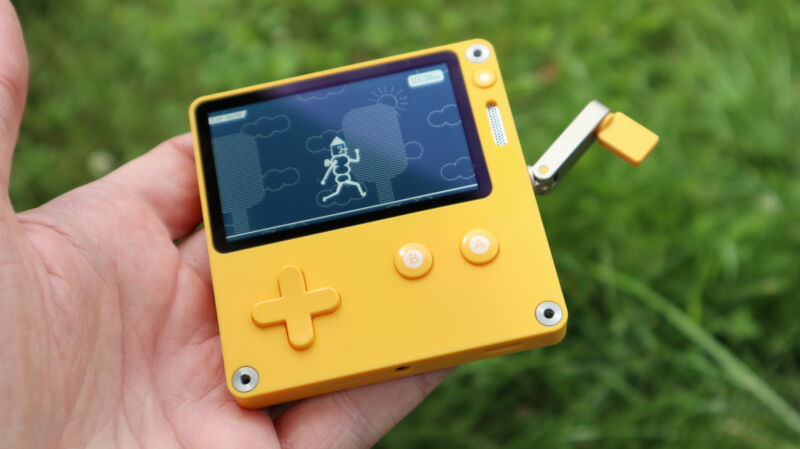
Lately, I find myself reminiscing about the era when digital playthings looked like toys. You may rightfully question my nostalgia about Tamagotchis, handheld LCD games, and the purple, handle-loaded GameCube, but my line of work revolves mostly around testing products with mature aspirations. Sometimes, I want companies to lighten up and put the "fun" in "functionality."
That bias contributes in some part to my interest in the Playdate, a $179 portable gaming system that errs on the side of childish, low-powered fun. I've spent three weeks testing the system's "near-final" hardware ahead of preorders opening up on 1 pm ET on Thursday, July 29, and I can confirm that it's indeed fun to look at. Luckily, it's also fun, simple, and accessible to hold, play with, and share with every friend that I can.
Later this year, the Playdate will reclaim the ground once dominated by Nintendo's '90s "Play It Loud" Game Boys. This handheld looks like something you'd pull out of a Yo Gabba Gabba monster's pouch: squat, thin, banana-yellow, and ready to be tickled with a twist of its built-in rotary crank. But make no mistake—the Playdate's creators at the game-publishing firm Panic have taken this device's fun very seriously, and the results have surprised me (especially in one key aspect).
I've yet to hand a Playdate to a friend without them remarking on how much they liked it. And usually, that praise comes with a statement along the lines of "this thing is way better than it looks online."
A preview, not a review
-
The shipping box isn't final, but this portion of it is, and it's cute, so here's a peek at how the Playdate may arrive for retail buyers. The "have fun" box includes an instruction manual and a yellow Type-C cable.Sam Machkovech
-
The lock screen can be customized with an analog clock, a digital clock, or this "word clock."Sam Machkovech
-
Playdate, compared to a Nintendo Switch.Sam Machkovech
-
It's not even two-thirds the size of the Switch screen.Sam Machkovech
-
"Banana-yellow" may be inaccurate if you're a Pantone purist, but here, have a banana size comparison.Sam Machkovech
-
3.5 mm jack for headphones; USB Type-C jack for power and file transfers with a PC.Sam Machkovech
-
Cranking in downtown Seattle.Sam Machkovech
-
Cranking at the toy store.Sam Machkovech
-
Cranking between two vinyl figurines—which are made of similar material as the Playdate.Sam Machkovech
-
The author plays with the Playdate on a friend's couch.Dant Rambo
-
Cranking before a movie—and notice how readable the screen is thanks to pre-movie lighting from above.Sam Machkovech
The Playdate is a portable-only gaming device meant to run exclusive software coded to either Lua or C. There's no TV dock, no way to add a second controller, and no slot to add a cartridge or SD card. The sticker price includes a "season pass" of games, which can be downloaded via Wi-Fi, though you can also use its USB Type-C connection to download compatible files from your PC.
And while I'd love to give you the complete run-through of the Playdate ecosystem, this is not a review. The console creators at Panic were kind enough to send us early hardware, which appears to be identical to what we'll see when retail units ship starting later this year. That means weak processing power, a black-and-white display, a plastic shell, an array of buttons, and an endlessly windable crank.
Where the final system will differ the most is in its OS and software package, and Panic has asked critics not to describe any menu-related content until further notice. Fine by us, though I had no complaints there. Everything I've tested has worked fine with the exception of one small bug that the hardware maker has acknowledged.
We've previously written about the Playdate's sales pitch, which goes back as far as a public splash at various expos in 2019. Its creators say they chose its most peculiar feature, a fully windable (and retractable) hand crank, to "break people of their touch psychosis." The game-release strategy revolves around a stream of new, simple game downloads with an emphasis on "surprise." Panic won't tell system owners what they'll get from its weekly game-launch cadence other than to expect two brand-new games per week for 12 weeks, all made by a mix of established indie creators and brand-new weirdos (more on those here).
These 24 games count as part of the system's $179 package cost, and that's the system's first crucial distinction.
reader comments
145